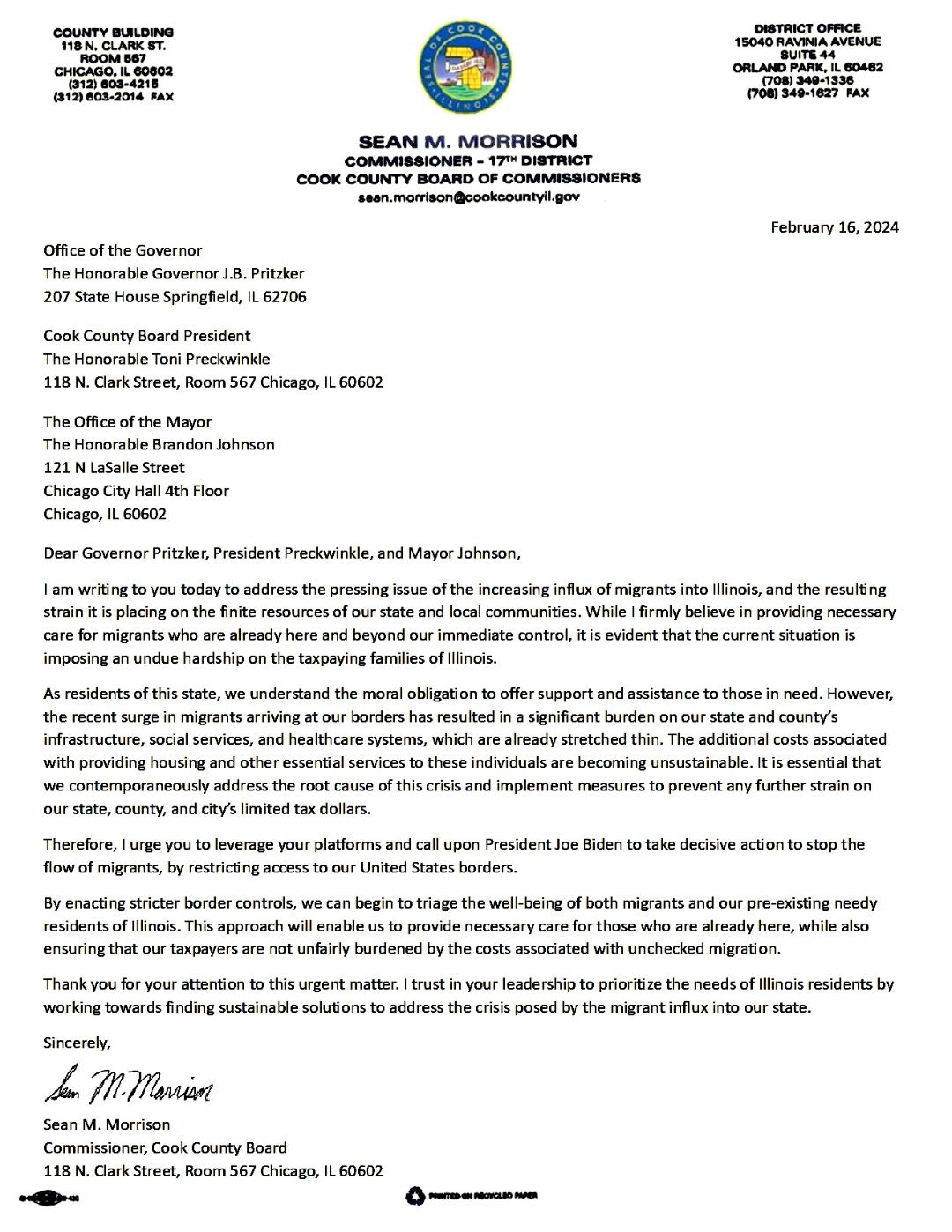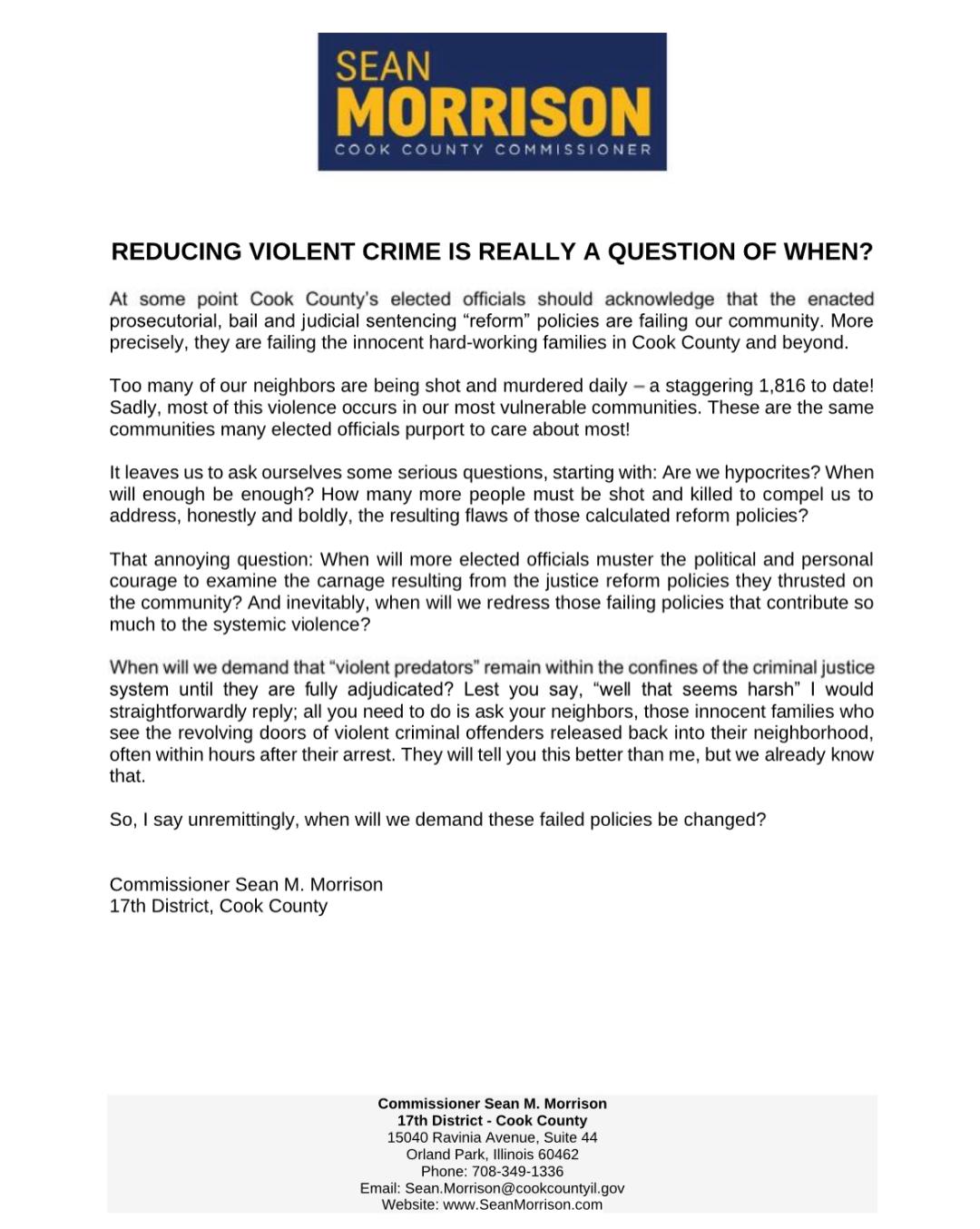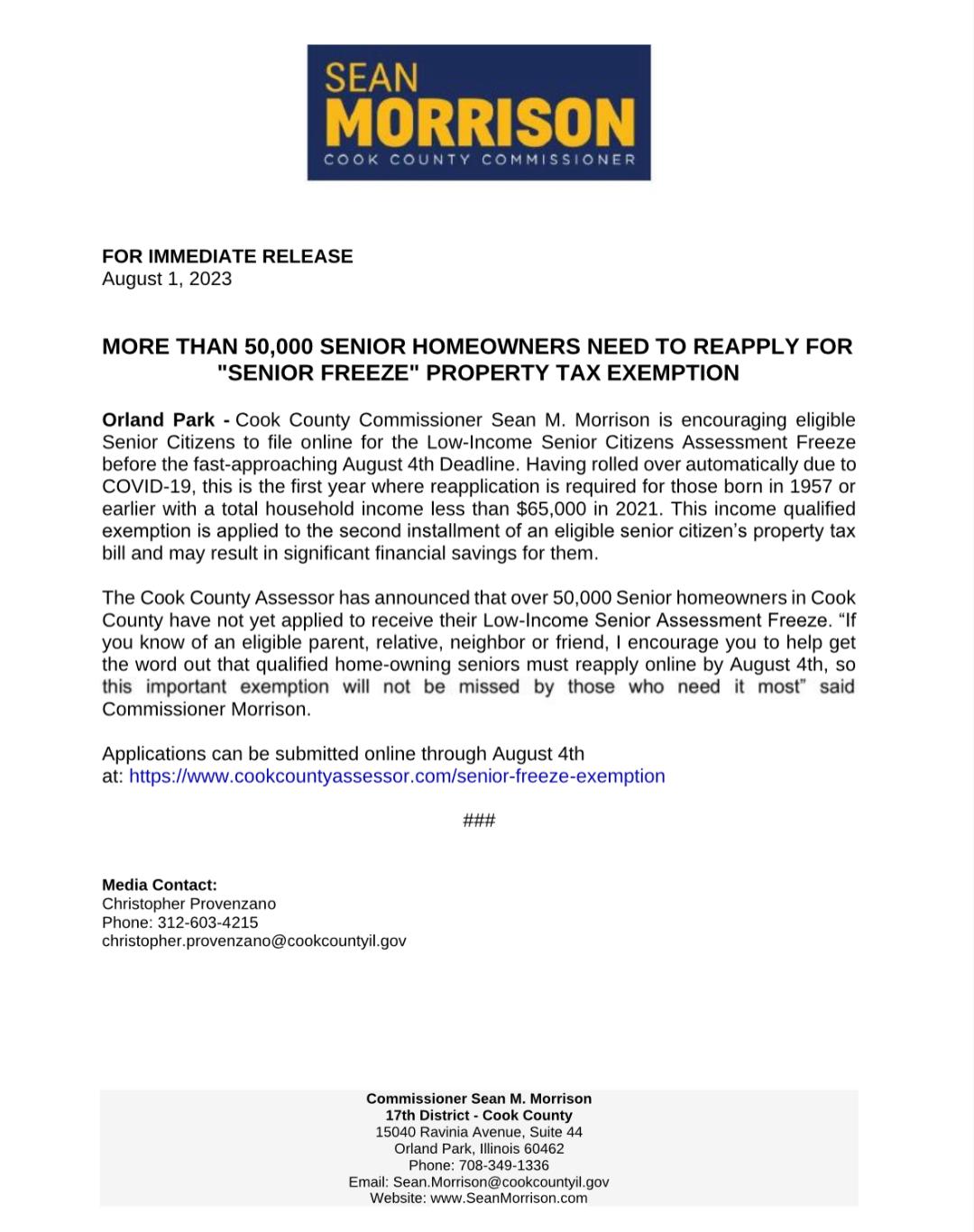STAY UP TO DATE






Unsustainable Migrant Crisis Wreaking Havoc on Illinois and Local Communities - Time for Border Closure




Headlines
November 18, 2024
Governor J.B. Pritzker
Office of the Governor
555 W. Monroe Street, 16th Floor
Chicago, Illinois 60661
President Toni Preckwinkle
Cook County Board
118 N. Clark Street, Room 537
Chicago, Illinois 60602
Mayor Brandon Johnson
Office of the Mayor of Chicago
City Hall, 121 N. LaSalle Street, Room 507
Chicago, Illinois 60602
Re: Urgent Call for Action on the Migrant Crisis and its Financial Impact on Illinois Taxpayers
Dear Governor Pritzker, President Preckwinkle, and Mayor Johnson:
As the migrant crisis in Illinois continues to grow, I am compelled to express serious concerns about its financial impact on Illinois taxpayers and the unsustainable nature of current spending levels. From February 2020 through October 31, 2024, the State of Illinois, Cook County and the City of Chicago have collectively allocated substantial taxpayer funds toward supporting the migrant population.
The State of Illinois alone has committed over $478 million to date on shelter, healthcare, and other essential services for migrants, many of whom have entered the United States illegally. Additionally, Illinois has ear-marked an extra $162 million for future support and pledged $440 million for Medicaid-style healthcare benefits for non-citizens, a considerable and growing commitment that places an overwhelming burden on Illinois’ budget. Cook County contributing approximately $100 million, and the City of Chicago allocating nearly $300 million.
This approach has come at a high cost to Illinois taxpayers, redirecting scarce funds away from other essential public services and increasing our financial obligations without an end in sight. Continuing to operate without a long-term strategy is untenable. Our shared responsibility to manage this crisis must also acknowledge the financial limitations of our state, county, and city budgets. As stewards of public resources, we are obligated to balance our humanitarian values with the fiscal reality and sustainability of our state, Cook County, and City of Chicago finances.
I urge your offices to develop a comprehensive plan that prioritizes the financial well-being of our citizens and work in collaboration with both the current federal administration and any future administration to develop a sustainable and fair approach to this massive crisis. This includes working with U.S. Immigration and Customs Enforcement, actively pursuing
diplomatic options to facilitate the return of migrants to their countries of origin. It is simply unfair to expect Illinois taxpayers to bear the long-term financial burden of providing comprehensive support indefinitely.
While we are morally bound to ensure the basic sustenance and dignity of those within our communities, it is also essential to advocate for a solution that does not compromise the public safety and economic stability of our residents. Our current approach has become increasingly unsustainable, and we must collectively seek solutions that will balance compassion with financial responsibility.
Thank you for your attention to this critical matter. I urge your offices to prioritize and collaborate on immediate action plans that address both the humanitarian and fiscal dimensions of this crisis.
Sincerely,
Commissioner Sean M. Morrison
17th District, Cook County
FOR IMMEDIATE RELEASE
November 15, 2024
Cook County Commissioner Sean Morrison calls on Board of Review Commissioner Samantha Steele to resign after DUI arrest
Cook County Board of Review Commissioner Samantha Steele was recently arrested for DUI after an alarming incident in Chicago. Reports indicate Steele struck multiple cars. Upon her arrest at the scene, Steele allegedly exhibited aggressive behavior towards the responding police officer, making sexually derogatory remarks and continued this belligerent behavior throughout the arrest and booking process. This incident raises serious concerns about her conduct and judgment as an elected official. If an elected official does not respect our dedicated police officers, then how can we expect the citizens to respect the police? Given the severity of the incident and the blatant disrespect shown towards law enforcement, it is in the public interest that Commissioner Samantha Steele resign her position on the Cook County Board of Review to restore public trust and accountability.
Commissioner Sean M. Morrison, 17th District, Cook County
MEDIA CONTACT
(P) 708-349-1336
March 14, 2024
Economic development, jobs, and tax revenue are the life blood for all communities. Without them a community will face a very difficult road maintaining a consistent level of sustainability and quality of life. The Village of Ford Heights is a suburban community in considerable need of all three elements.
The Cook County Board has made it a priority to address the needs and provide support whenever possible to communities like Ford Heights until today’s vote (on 3/12/24). To my dismay, I was the lone vote in opposition to the Forest Preserve District of Cook County’s (FPDCC) proposal to purchase 56 acres of open land in the Village of Ford Heights. A land purchase that was strongly opposed by the village.
In a letter to the County Board, Ford Heights Mayor Charles R. Griffin stated, “the 56 Acres are also a large portion of the U.S. Route 30/Joe Orr Road TIP district (Transportation Improvement Program) and redevelopment project area that will be adopted by the board of trustees in April of 2024. The Forest Preserve plan to purchase this land would cripple the Tax Increment Financing district as a commercial and industrial development in that area. Economically, the Village of Ford Heights would be severely crippled and the detriment to the village shall greatly outweigh the environmental benefits for the Forest Preserve District.”
I concur with the sentiments reflected by Mayor Griffin in his letter so I could not in good conscience support voting to strip potential economic development and job creation opportunities to a most in need community like Ford Heights. I concur with the position articulated by Mayor Griffin in his letter so I could not in good conscience support voting to strip potential economic development and job creation opportunities to a community most in need. Supporting economic development and job creation should be paramount for the Cook County Board, especially in the case of Ford Heights. But the County Board disregarded the urging from Ford Heights elected officials to “remove this item from all future meeting agendas and allow the village officials to meet with the necessary parties to reach an agreement that would benefit both entities.”
If the County Board is sincere in its commitment to “equitable” solutions for marginalized communities, then we ought to work with the Village of Ford Heights to maximize economic development and job creation opportunities to help grow and strengthen their community. Their voice should not be ignored.
Unfortunately, today’s vote did the opposite and undercut the Village of Ford Heights. Removing 56 acres of prime land from their long-term economic development plans is not in their community’s best interest.
- Commissioner Sean M. Morrison
17th District, Cook County
Attachment: Village of Ford Heights Letter [Dated: 2/28/24]



On February 29th, Commissioner Sean Morrison was pleased to recognize Kenneth and Angela Townsend (pictured), franchisee owners of Robeks Juice in Orland Park, as the Black History Month Honorees for Cook County's 17th District.
Commissioner Morrison nominated them, franchisee owners of Robeks Juice, as distinguished business owners and black leaders in the 17th District of Cook County.
Kenneth and Angela are health-conscious individuals who prioritize fitness and mindful consumption, and we're therefore naturally inclined to seek out business options aligned with their values.
Please visit Kenneth and Angela at ROBEKS FRESH JUICES & SMOOTHIES at 9400 W. 159th Street in Orland Park.

Contact Us
Chicago Office
118 N. Clark Street, Suite 567
Chicago, Illinois 60602
Phone : 312-603-4215
Fax: 312-603-2014
District Office
15040 Ravinia Ave, Suite 44
Orland Park, Illinois 60462
Phone: 708-349-1336
Fax: 708-349-1627
